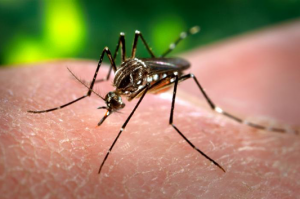
Aedes aegypti. Photo: James Gathany, CDC
To develop a mosquito control strategy with a minimal ecological footprint, biochemists and entomologists from the University of Arizona have pioneered a novel approach by harnessing the unique alkaline environment of larval mosquito guts.
Using specially designed chemical compounds, the team has selectively modified gut proteins of mosquito larvae, marking a significant advance in the fight against mosquito-borne diseases.
The study was published in the Journal of the American Chemical Society.
“Coming up with unique targets against mosquito larvae is a powerful tool as resistance continues to develop against [some of] the current approaches,” Dr. Michael Riehle, a professor at the University of Arizona Department of Entomology and a senior author on the paper, said in the news release.
“We came across some chemical compounds that had a unique reactivity at high (basic) pH and we knew mosquito larvae happen to have this unique high pH environment,” said Dr. John Jewett, an associate professor in the Department of Chemistry and Biochemistry.
Two former graduate students at the Department of Chemistry and Biochemistry, Lindsay Guzmán and Anjalee Wijetunge, led the study.
The team designed chemical compounds known as protected triazabutadienes that are inactive under normal conditions. But in high pH environments such as a mosquito larva’s gut, the compounds release highly reactive molecules called aryl diazonium ions, which then bond with the larval gut proteins and modify them.
“You could liken these molecules to being animals with muzzles. Once the muzzles are removed at high pH, they can latch onto proteins in their vicinity,” Dr. Jewett said.
The modified proteins are tagged with fluorescent markers through a highly efficient chemical linking process. The fluorescent markers served to confirm that these designer probes entered the larva and carried out the modification.
Dr. Jewett said this two-step labeling can be thought of as adding a tracker to an animal in the wild that is relatively small and non-perturbing. The second step: The fluorescent molecule would be someone following the tracker and painting it bright pink so that everyone can find it easily.
This tagging enables the detection of modified proteins using a variety of biochemical techniques for isolating and separating proteins.
The compounds reported in their work are not acutely toxic to mosquito larvae, but they do modify the proteins found in the larval gut. The research groups are currently studying if the compounds have long-term effects on the larvae digesting food, growing and becoming adults, Dr. Jewett said.
Since the target is mosquito larvae, which are aquatic, the chemical compound can be directly put into water like several other currently used larvicides, Dr. Jewett said. The advantage of this technology is that it specifically targets mosquito larvae and doesn’t pose harm to other aquatic animals. Very few organisms in the aquatic environment have a very high pH like mosquito larvae, Dr. Jewett mentioned.
Although the team performed the study with only one mosquito species, Aedes aegypti, the high pH gut environment is widespread across other mosquito species such as Anopheles and Culex, Dr. Riehle said. Other than mosquitoes, the novel probe also targets the larvae of black flies (Simulium spp.), thanks to their high pH gut. Black flies are important vectors of river blindness, Dr. Riehle said.
In the future, the research group is planning to attach different potentially toxic compounds to this chemical compound, and then test how effective they are at killing mosquito larvae.
“Initially, we thought the requirement for a high pH to release the reactive compound was a liability, but then we realized that that was a useful environment for mosquito biology,” Dr. Jewett said. “And then, it ended up working out quite nicely.”
Leave A Comment